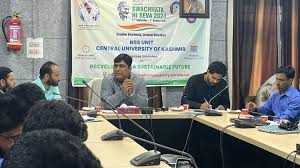
Continuing with the ongoing Swachhata Hi Seva campaign-2025, Department of Students Welfare (DSW) and National Service Scheme (NSS), Central University of Kashmir (CUK), jointly organised a one-day workshop on “Recycling Waste: Advocacy for Swachhata” at the Green Campus here on Friday.
Addressing the participants, Coordinator, NSS, Dr. Shabir Ahmad Ahanger, highlighted the alarming statistics of waste generation in the country. He highlighted how improper waste disposal contributes to pollution, climate change, and health hazards. Warning against the dangers of unchecked plastic use and improper waste disposal, Dr. Shabir Ahmad explained the harmful effects of plastics on land, water, air, wildlife, and human health. He pointed out how microplastics have infiltrated the food chain and underscored the long-term consequences of waste mismanagement, including global warming, biodiversity loss, and climate change disasters such as floods and cloudbursts.
In her presentation, Officer NSS, Dr. Shahnaz Akhtar, underscored the need to integrate recycling into everyday life as part of the Swabhav Swachhata, Sanskaar Swachhata campaign. Dr. Shahnaz advocated for systematic waste segregation, explaining that separating waste into categories like organic, recyclable, and hazardous waste not only makes recycling more efficient but also minimizes harmful environmental impacts. She noted that recycling is not merely a waste management strategy but a way of life that resonates with India’s cultural values of responsibility, discipline, and sustainability. “Recycling is central to building a sustainable future. It conserves resources, reduces pollution, minimizes landfill use, and paves the way for a circular economy that benefits both people and the planet,” Dr. Shahnaz remarked.
Explaining the 3Rs of Recycling—Reduce, Reuse, and Recycle-Dr. Shahnaz shared several creative recycling activities and DIY tips. These included reusing glass jars as storage containers, transforming old clothes into reusable shopping bags, repurposing cardboard boxes for household organization, turning tin cans into plant pots, and composting kitchen scraps.
Speaking on the occasion, Sr. Asst Prof. Deptt of Religious Studies, Dr. Muhammad Ahmed Reza drew attention to the ethical and spiritual dimensions of environmental protection. He emphasized that religions across the world preach cleanliness, and responsibility towards nature, and thus avoiding waste and pollution is both a civic and moral obligation.
Youth welfare Officer, Dr. Adil Amiz Nazki, who conducted the programme proceedings, said such initiatives are vital in nurturing socially responsible citizens and aligning the university’s commitment with the larger Swachhata Hi Seva 2025 movement.
Youth Welfare Officer, Dr. Harpal Singh proposed the vote of thanks.
Continuing with the ongoing Swachhata Hi Seva campaign-2025, Department of Students Welfare (DSW) and National Service Scheme (NSS), Central University of Kashmir (CUK), jointly organised a one-day workshop on “Recycling Waste: Advocacy for Swachhata” at the Green Campus here on Friday.
Addressing the participants, Coordinator, NSS, Dr. Shabir Ahmad Ahanger, highlighted the alarming statistics of waste generation in the country. He highlighted how improper waste disposal contributes to pollution, climate change, and health hazards. Warning against the dangers of unchecked plastic use and improper waste disposal, Dr. Shabir Ahmad explained the harmful effects of plastics on land, water, air, wildlife, and human health. He pointed out how microplastics have infiltrated the food chain and underscored the long-term consequences of waste mismanagement, including global warming, biodiversity loss, and climate change disasters such as floods and cloudbursts.
In her presentation, Officer NSS, Dr. Shahnaz Akhtar, underscored the need to integrate recycling into everyday life as part of the Swabhav Swachhata, Sanskaar Swachhata campaign. Dr. Shahnaz advocated for systematic waste segregation, explaining that separating waste into categories like organic, recyclable, and hazardous waste not only makes recycling more efficient but also minimizes harmful environmental impacts. She noted that recycling is not merely a waste management strategy but a way of life that resonates with India’s cultural values of responsibility, discipline, and sustainability. “Recycling is central to building a sustainable future. It conserves resources, reduces pollution, minimizes landfill use, and paves the way for a circular economy that benefits both people and the planet,” Dr. Shahnaz remarked.
Explaining the 3Rs of Recycling—Reduce, Reuse, and Recycle-Dr. Shahnaz shared several creative recycling activities and DIY tips. These included reusing glass jars as storage containers, transforming old clothes into reusable shopping bags, repurposing cardboard boxes for household organization, turning tin cans into plant pots, and composting kitchen scraps.
Speaking on the occasion, Sr. Asst Prof. Deptt of Religious Studies, Dr. Muhammad Ahmed Reza drew attention to the ethical and spiritual dimensions of environmental protection. He emphasized that religions across the world preach cleanliness, and responsibility towards nature, and thus avoiding waste and pollution is both a civic and moral obligation.
Youth welfare Officer, Dr. Adil Amiz Nazki, who conducted the programme proceedings, said such initiatives are vital in nurturing socially responsible citizens and aligning the university’s commitment with the larger Swachhata Hi Seva 2025 movement.
Youth Welfare Officer, Dr. Harpal Singh proposed the vote of thanks.
© Copyright 2023 brighterkashmir.com All Rights Reserved. Quantum Technologies